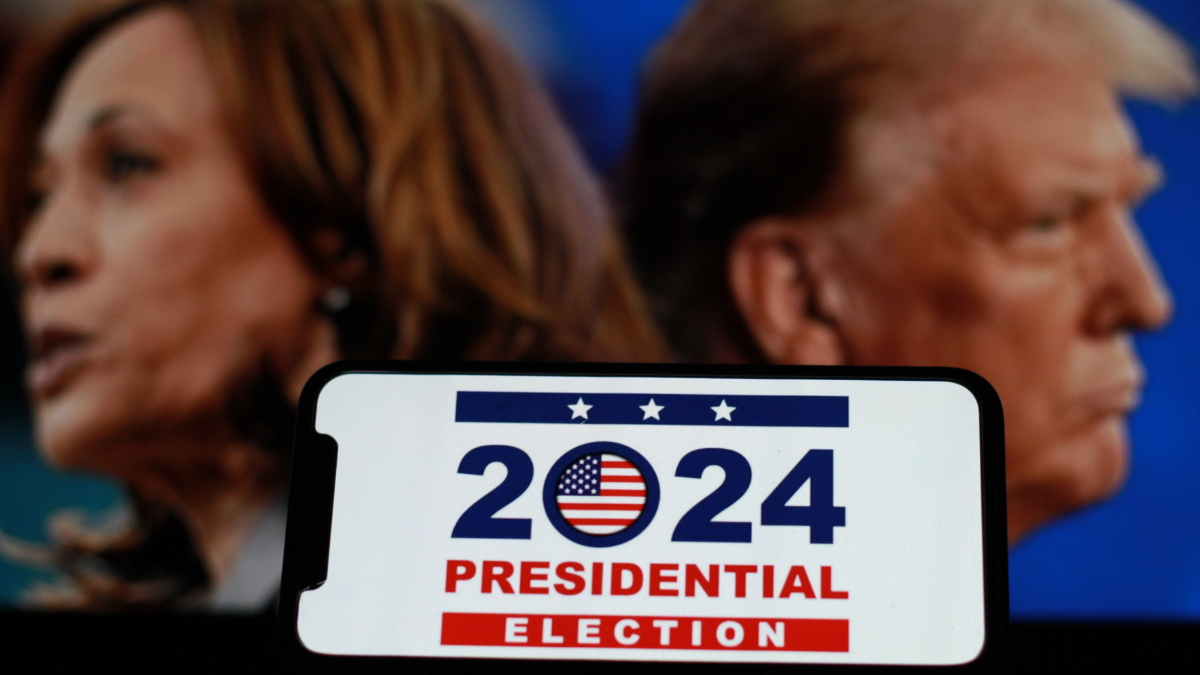US Election: What the Democratic and Republican Parties Say About Tech Policy
Gabby Miller, Prithvi Iyer / Aug 20, 2024
Vice President Kamala Harris and former President Donald Trump will face off in the November US presidential election. Muhammad Alimaki/Shutterstock. July 25, 2024.
With just 76 days remaining before the United States November elections, the major parties have released their official platforms. While there is a broader discourse within both parties about tech policy issues than what is captured in the documents released at last month’s Republican National Convention and this week’s Democratic National Convention, the respective party platforms offer some useful insight into how a government led by one party might approach tech issues differently than the other.
The Democratic Party released its official 2024 platform in advance of the DNC’s kickoff in Chicago Monday evening, which hones in on nine key areas, including economic growth, the climate crisis, and immigration. Notably, the platform was finalized in July, prior to President Biden’s decision to step aside from the 2024 presidential campaign. It was ratified at the Democratic convention on Tuesday evening. Vice President Kamala Harris will headline the final day of the convention, and is scheduled to make her presidential acceptance speech on Thursday evening.
The 92-page document is replete with what Democrats consider to be landmark achievements made under the Biden-Harris administration, including President Joe Biden’s Executive Order on the “Safe, Secure, and Trustworthy Development and Use of Artificial Intelligence.” While not a major priority of the Democratic Party’s platform, the document still references a a number of other tech policies, most of which expand on the Biden-Harris administration’s existing work. The most significant ones focus primarily on protecting children online and strengthening data privacy protections, which the document says fall under Democrats’ “unity” agenda. The party’s vision also aims to balance the “promise and peril” that artificial intelligence holds as a future Democratic administration “acts fast” to “ensure that AI serves the public interest.”
Related Reading:
- White House Executive Order on AI Gives Sweeping Mandate to DHS
- Unpacking the Blueprint for an AI Bill of Rights
- Tech Policy Press/YouGov Poll Finds Support for US Surgeon General Warning Label for Social Media
In contrast, the Republican Party has offered relatively less insight into its tech policy agenda under a second Trump term in its official platform, with just a few paragraphs dedicated to the issue in the document published in early July. It mostly outlines a GOP approach to AI regulation, including a promise to repeal Biden’s AI executive order, and how it plans to fight back against the “un-American crypto crackdown.” The GOP also plans to use “advanced technologies” to monitor and secure the border as well as modernize the military.
Both parties take a tough stance on China, which suggests some aspects of US tech policy may be more or less the same no matter which party has more say after November. The Democrats refer to China as the country’s most important “strategic competitor,” while the Republicans promise “strategic independence” and more significant reductions in trade with Chinese companies.
Below is a full list of tech-related policy proposals as sketched out by both the Democratic and Republican parties’ 2024 presidential platforms, respectively:
The Democrats
1. Protecting Kids Online, Strengthening Americans’ Data Privacy, and Promoting Competition
The Democratic Party platform narrows in on the ways tech platforms collect and exploit users’ data and how social media has a particularly negative effect on kids’ mental health and well-being. In order to hold Big Tech companies accountable, the party calls for:
- Passing bipartisan legislation to protect kids’ privacy and stop Big Tech from collecting kids and teenagers’ personal data online and ban targeted advertising to children
- Putting stricter limits on the personal data collect for all consumers
- Strengthening legal protections for survivors and victims of non-consensual intimate imagery, including those generated by AI
- Building on the federal civil cause of action established by the Violence Against Women Act Reauthorization of 2022
2. Promote Competition and Privacy in the Tech Industry
The Democratic Party calls on both Democrats and Republicans to pass bipartisan legislation that will promote competition and privacy in the tech industry. This agenda includes:
- Promoting interoperability between tech services and platforms
- Allowing users to control and transfer their data
- Preventing large platforms from giving their own products and services "an unfair advantage in the marketplace"
- Reforming Section 230 to "ensure that platforms take responsibility for the content they share"
- Updating the Consumer Privacy Bill of Rights
- Protecting student data privacy by ensuring what is collected in schools is only used for education
- Updating the Electronic Communications Privacy Act to protect personal electronic information and safeguard location information
3. Seizing the Promise and Managing the Risks of AI
The Democratic Party is calling for swift “solutions” to realizing the promise of AI while managing its risks. The platform says this can be realized by:
- Ensuring that workers get a voice in how AI is used in their workplace and that they share fairly in any economic gains AI produces.
- Mitigating discrimination, bias, and other abuses in justice, health care, education, and housing, building on the work outlined in the Blueprint for an AI Bill of Rights
- Combatting algorithmic discrimination across the economy
- Advocating for the safe and secure development of AI
- Accelerating hiring AI professionals across the federal government and enhance successful initiatives for training additional scientists in AI
- Investing further in the AI Safety Institute to create guidelines, tools, benchmarks, and best practices for evaluating dangerous AI risks and capabilities
- Prioritizing funding for critical AI research and development that advances AI safety
- Banning voice impersonations
- Creating heightened protections in critical sectors such as health care, financial services, education, housing, and transportation
- Responsibly developing, test, procure, integrate transformative AI across the federal government
4. Other Tech-Related Policies:
Additional tech policy agenda items can be found sprinkled throughout the platform, with a large focus on geopolitics and strengthening American leadership abroad. These include:
- De-risking and diversifying the economic relationship between the US and China, as opposed to decoupling, to guard against China and its willingness to use US technologies against America and its allies
- Increase tariffs on Chinese products like semiconductors, electric vehicles, batteries, among others, and reshore their respective supply chains.
- Create focused restrictions on certain sensitive technologies to preserve national security
- Increase cooperation with India by investing in the US-India Initiative on Critical and Emerging Technology
Other tech policies are briefly mentioned within the Democratic Party's plans to secure the border and invest in clean-energy. These include:
- Leveraging the federal government to stop tech platforms from being used for criminal conduct, including sales of dangerous drugs like fentanyl
- Speeding up the process of clean-energy permitting to incentivize the production of cleaner, more affordable energy
The full 2024 Democratic Party platform can be found here.
The Republicans
In order to pave the way for “future economic greatness,” the GOP plans to lead the world in advancing burgeoning industries and emerging technologies.
1. Cryptocurrency
The GOP is bullish on cryptocurrency. It promises a range of policy interventions to help the industry, including:
- Ending Democrats' "unlawful and un-American crypto crackdown"
- Opposing the creation of a central bank digital currency
- Defending the right to mine Bitcoin
- Ensuring every American has the right to self-custody of their digital assets and transact free from government surveillance and control
2. Artificial Intelligence
The Republicans prefer a more laissez-faire approach to artificial intelligence.
- Repealing Biden’s executive order on artificial intelligence that “hinders AI innovation” and “imposes radical leftwing ideas” on its development
- Supporting AI development “rooted in free speech and human flourishing”
3. Other Tech-Related Policy Proposals:
- In a bid to “return to peace through strength,” Republicans will modernize the military by investing in cutting-edge research and advanced technologies, including an Iron Dome Missile Defense Shield.
- In order to stop the “migrant invasion,” Republicans will use “advanced technology to monitor and secure the border.”
The full 2024 Republican Party platform can be found here.
A Note on Project 2025
Although not an official party platform, the Heritage Foundation’s Project 2025, published earlier this spring, has been widely regarded as a roadmap for a possible second Trump term, given that so many of the people who helped author it are in Trump’s orbit. The 922-page document is an exhaustive, uber-conservative policy wishlist that’s made waves for some of its more extreme proposals, such as gutting access to abortion, targeting immigrant communities with mass deportations, and dismantling decades of hard fought LGBTQ+ rights.
As far as tech policy is concerned, Project 2025 advises instituting sweeping reforms to key regulatory agencies, including the Federal Trade Commission, and rolling back constraints – such as environmental regulations – that would benefit AI and cryptocurrency companies and investors, according to a report from the nonprofit Tech Oversight Project.
Where US Voters Stand
It’s unlikely that tech policy issues will drive a substantial number of US voters to the polls or sway who they cast their ballots for. However, the American public does appear to want more aggressive tech regulation, according to a recent Tech Policy Press/YouGov poll. The poll, which collected responses from 1,161 US voters between July 24 and July 26, 2024, measured the publics’ appetite for regulation across three technologies: AI, cryptocurrency, and social media.
61% of the surveyed sample believe that the US government should do more to regulate AI, a significantly higher percentage than the 8% who preferred less government regulation. A little more than half of the surveyed sample (51%) believed that cryptocurrencies need more government regulation. In contrast, a smaller proportion of the sample (42%) felt the need for greater regulation of social media platforms.
Considering party affiliation as a factor, some patterns emerge that are congruent with the party platforms.
- Democrats consistently show the highest support for increased regulation across all three technologies:
- 72% support more regulation for AI
- 51% support more regulation of social media
- 62% support more regulation of cryptocurrency
- Republicans show lower levels of support for increased regulation but still have significant percentages in favor:
- 52% support more regulation of AI
- 33% support more regulation of social media
- 41% support more regulation of cryptocurrency
Looking to November
In general, the party platforms serve to underscore the broader ideological divide between Republicans and Democrats on the best path forward, including with regard to technology. Democrats emphasize the need for innovation that serves the public good and regulations that protect against technology’s harms. In contrast, Republicans prize an approach to innovation premised on economic freedom and minimal government interference. Even where there is agreement – such as the need to take a firm stance against China or to ensure child online safety – there are significant differences in how the parties approach the issues. Platforms are best thought of as wish lists, but they are not “meaningless fluffery." A distinct choice is now before US voters this November.
Authors

